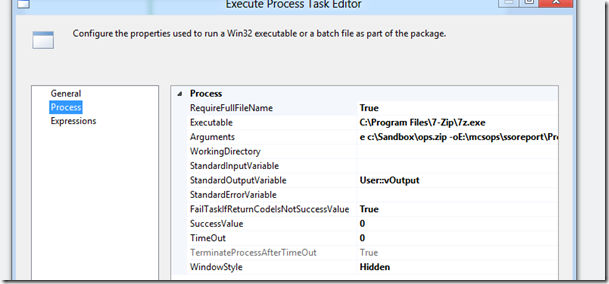Redux: Using a C# script task in SSIS to download a file over http
A few people have asked for further information about the C# script task which I blogged about (quite a while ago). I mistakenly forgot to add the full source code, sorry everyone. Here is the link to the original blog post: https://blogs.msdn.com/benjones/archive/2009/03/29/using-a-c-script-task-in-ssis-to-download-a-file-over-http.aspx
I have since imported the SSIS package into Visual Studio 2010 (BIDS) and the code compiles without error. Some of the code below is truncated on the right (just a formatting issue I need to resolve) but the core of the code is there.
As always, let me know if there are any problems.
/*
Download a file over http using Script Task in SQL Server 2008 R2 Integration Services.
Two key variables, vSSOReportURL, which is constructed in a prior Script Task e.g. https://www..
vSSOLocalFileName, which is the fully qualified reference for the downloaded file e.g. c:\myfile.zip
*/
using System;
using System.Data;
using Microsoft.SqlServer.Dts.Runtime;
using System.Windows.Forms;
using System.Net;
using System.Net.Security;
namespace ST_7e897e41dd5945f3b77366d32f0a97e0.csproj
{
[Microsoft.SqlServer.Dts.Tasks.ScriptTask.SSISScriptTaskEntryPointAttribute]
public partial class ScriptMain : Microsoft.SqlServer.Dts.Tasks.ScriptTask.VSTARTScriptObjectModelBase
{
#region VSTA generated code
enum ScriptResults
{
Success = Microsoft.SqlServer.Dts.Runtime.DTSExecResult.Success,
Failure = Microsoft.SqlServer.Dts.Runtime.DTSExecResult.Failure
};
#endregion
public void Main()
{
WebClient myWebClient;
string RemoteURI;
string LocalFileName;
bool FireAgain = true;
Variables vars = null;
Dts.VariableDispenser.LockForRead("User::vSSOReportURL");
Dts.VariableDispenser.LockForRead("User::vSSOLocalFileName");
Dts.VariableDispenser.LockForWrite("User::vSSOReportURLIndicator");
Dts.VariableDispenser.GetVariables(ref vars);
try
{
// Ignore certificate warnings
ServicePointManager.ServerCertificateValidationCallback =
new RemoteCertificateValidationCallback(delegate { return true; });
// Initiate webclient download, use default credentials (current login)
myWebClient = new WebClient();
myWebClient.Credentials = CredentialCache.DefaultCredentials;
RemoteURI = vars["User::vSSOReportURL"].Value.ToString();
LocalFileName = vars["User::vSSOLocalFileName"].Value.ToString();
// Log provider notification
Dts.Events.FireInformation(0, String.Empty, String.Format("Downloading '{0}' from '{1}'",
LocalFileName, RemoteURI), String.Empty, 0, ref FireAgain);
// Download the file
myWebClient.DownloadFile(RemoteURI, LocalFileName);
// Set report URL indicator, this is used to determine the http source of the
// download i.e. vSSOReportURL or vSSOReportURLRetry for the message which is
// written to the table
vars["User::vSSOReportURLIndicator"].Value = 0;
// Return success
Dts.TaskResult = (int)ScriptResults.Success;
}
catch (Exception ex)
{
// Catch and handle error
Dts.Events.FireError(0, String.Empty, ex.Message, String.Empty, 0);
Dts.TaskResult = (int)ScriptResults.Failure;
}
}
}
}
The files are extracted using an Execute Process Task (with 7-Zip) as shown below:
And the arguments are set using the expression (below). There are probably better ways of doing this but I found this worked well.
The .zip file is then archived using a File System task and the extracted file is renamed to .xlsx.

